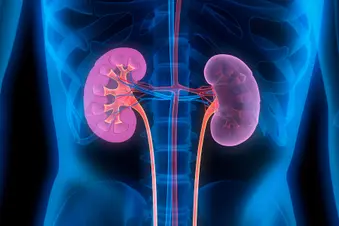
Iron-deficiency anemia is a common complication of chronic kidney disease (CKD). It happens when your body doesn't have enough iron. You need iron to make the protein hemoglobin, which helps your red blood cells carry oxygen from your lungs to the rest of your body. That’s why anemia can leave you tired, weak, and short of breath.
Not only can iron-deficiency anemia affect your quality of life, it can also damage your heart.
Why Do People With Chronic Kidney Disease Get Iron-Deficiency Anemia?
Anyone can get iron-deficiency anemia, but it's more common in people with chronic kidney disease. Anemia also tends to get worse the longer you have kidney disease.
Chronic kidney disease has 5 stages. About half of people with chronic kidney disease in stages 2 through 5 have an iron deficiency. You can become low in iron in 2 ways: through diet and blood loss. Chronic kidney disease makes it harder for your body to absorb iron from foods like spinach and meat. Dialysis for chronic kidney disease can cause blood loss, as can having numerous blood tests. Low iron can lead to anemia.
To complicate matters, your kidneys play a role in red blood cell production. In addition to filtering waste and extra water out of your blood, your kidneys make a hormone called erythropoietin (EPO). It tells your body to make new red blood cells. Damage from chronic kidney disease prevents your kidneys from making enough of this hormone. When your EPO levels are low, your red blood cell count drops and you get anemia.
While chronic kidney disease alone can give you anemia, you're more likely to get anemia if you have chronic kidney disease and another risk factor such as:
- Diabetes
- High blood pressure or heart disease
- You're over age 60
- You're Black
What Are the Symptoms?
Anemia doesn't always cause symptoms at first. In fact, you might not know that you have it unless your doctor gives you a blood test. But as oxygen levels continue to drop in your lungs, brain, and heart, you might:
- Feel short of breath
- Feel tired and low in energy
- Have trouble concentrating
- Get dizzy
- Have a fast heartbeat
- Have pale skin
Iron-deficiency anemia is also hard on your heart. When your organs don't get enough oxygen, your heart has to pump even harder to push out more blood. That extra work can damage your heart muscle.
Should I Talk to My Doctor?
See your doctor if you have symptoms like pale skin or shortness of breath.
Your doctor will do regular blood tests to check your kidney function, red blood cell count, and iron level. The test for anemia measures the amount of hemoglobin in your blood. A low hemoglobin level means you have anemia.
Call 911 or go to an emergency room right away if you have symptoms like these:
- Trouble breathing or severe shortness of breath
- Chest pain
- Fast or irregular heartbeat
How Is It Treated?
The treatment you get for anemia depends on the cause. Treatments include:
- Erythropoiesis-stimulating agents (ESAs). These medicines tell your body to make more red blood cells. You get them by injection.
- Hypoxia-inducible factor–prolyl hydroxylase inhibitors (HIF-PHI) are a new class of oral medicines for the treatment of anemia of CKD in adult patients on dialysis.
- Iron supplements. You can take iron in a pill or as an injection at your doctor's office. If you're on dialysis, you may get an iron supplement during treatment.
- Blood transfusion. Red blood cells from a healthy donor can relieve the symptoms of anemia.
If you think you have anemia, it's important to see your doctor for tests and treatment. Anemia can affect your quality of life and make your kidney disease worse. Getting treatment right away for anemia will help slow chronic kidney disease.
Show Sources
SOURCES:
American Kidney Fund: "Anemia symptoms, causes and treatments."
Frontiers in Medicine: "Anemia in Chronic Kidney Disease: From Pathophysiology and Current Treatments, to Future Agents."
National Kidney Foundation: "Anemia and Chronic Kidney Disease."
National Institute of Diabetes and Digestive and Kidney Diseases: "Anemia in Chronic Kidney Disease."
University of California, San Francisco: "Hemoglobin and Functions of Iron."